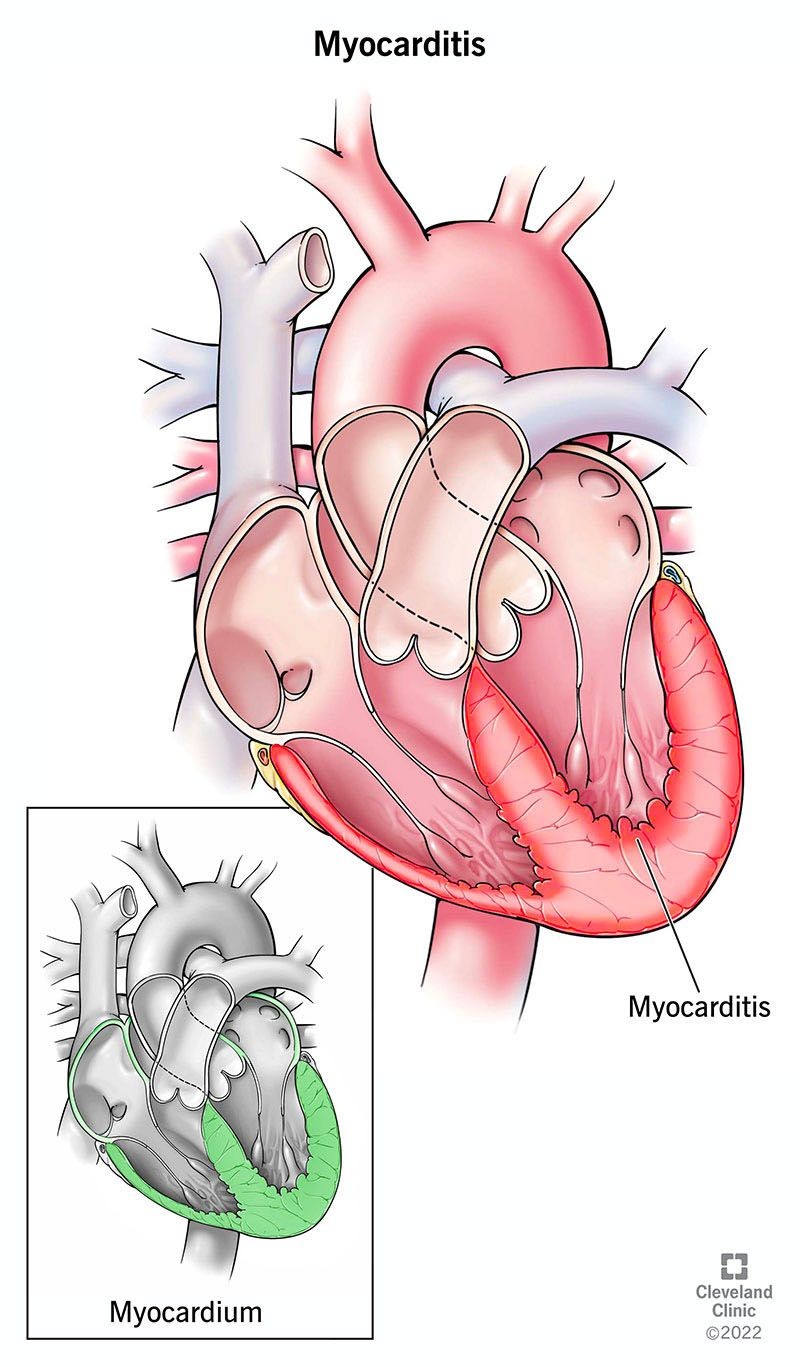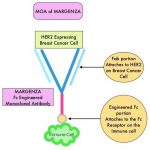
Contents
Myocarditis
Myocarditis is inflammation of the heart muscle. It is often caused by a virus infection, usually following an upper respiratory infection like a cold.
Myocarditis mainly affects people ages 20-50. Symptoms include chest pain, heart rhythm changes, and symptoms of congestive heart failure such as shortness of breath, weakness, and swelling.
Pericarditis, inflammation of the sac that lines the heart, may also be present at the same time.
Types of Myocarditis
Myocarditis is inflammation of the heart muscle cells. Sometimes patients have mild myocarditis that resolves quickly and they may not be aware of their illness.
Symptoms can help classify the illness:
– Acute myocarditis refers to the onset of heart failure symptoms within three months. Patients may experience chest pain similar to a heart attack, but there is no blockage in the heart’s arteries.
– Chronic myocarditis develops after three months.
– Fulminant myocarditis occurs when a patient rapidly develops severe heart failure. This results in symptoms such as shortness of breath, weakness, chest pain, and swelling due to fluid buildup in the body’s tissues.
Causes of Myocarditis
The most common cause of myocarditis in North America and Europe is viral infections. However, Chagas disease, caused by the parasite Trypanosoma cruzi, is the most common cause worldwide.
Other causes include:
– Idiopathic myocarditis, where the inflammation’s reason cannot be determined. This occurs in about half of cases, mostly in infants and children.
– Autoimmune and immune disorders, such as sarcoidosis, systemic lupus erythematosus (SLE), and scleroderma.
– Snake venom, alcohol, cocaine, arsenic, and heavy metal poisonings.
– Myocarditis as a rare complication of smallpox vaccination.
– Rare association between myocarditis and SARSCOVID-19 vaccination, with a risk of less than 1 in 10,000, mostly affecting young males.
Symptoms of Myocarditis
Many people with myocarditis are unaware they have the illness, as they may not have symptoms or experience mild symptoms that resolve on their own.
Common symptoms include chest pain, shortness of breath, and occasional fever. The chest pain can be sharper than a heart attack but can be challenging to differentiate.
As heart muscle inflammation worsens, it loses its ability to contract effectively and pump blood, leading to symptoms of heart failure like shortness of breath, swelling, and organ failure.
Arrhythmias, or abnormal heart rhythms, can also occur due to the inflammation.
Infants and children with myocarditis may present with non-specific symptoms like malaise, poor feeding, cough, fever, or abdominal pain.
Diagnosis of Myocarditis
Myocarditis is suspected when a patient has chest pain and shortness of breath but does not have risks for coronary artery disease.
Initial tests include electrocardiogram (EKG), blood tests to measure chemicals released during heart muscle inflammation, and a chest X-ray.
Additional tests may include blood tests for general body inflammation, echocardiogram to evaluate heart function and identify pericarditis or fluid accumulation, heart catheterization to evaluate heart arteries, and heart MRI to assess heart function and support diagnosis.
A definitive diagnosis of myocarditis requires a heart muscle biopsy, although this is not commonly performed.
Treatment for Myocarditis
Many patients recover without treatment or require only rest for mild symptoms.
Treatment focuses on managing heart failure symptoms.
Amiodarone may be used if dangerous heart rhythms occur.
Immune-suppressing medications may be necessary for myocarditis related to autoimmune diseases.
In severe and prolonged cases, if the heart muscle does not recover, a heart transplant may be considered.
Things to Avoid with Myocarditis
Patients with myocarditis should avoid exercise and restrict alcohol consumption.
Anti-inflammatory medications like ibuprofen are not effective in treating heart muscle inflammation and can worsen heart failure.
By clicking "Submit," I agree to the MedicineNet Terms and Conditions and Privacy Policy. I also agree to receive emails from MedicineNet and I understand that I may opt out of MedicineNet subscriptions at any time.
Prognosis and Recovery for Myocarditis
Most patients with myocarditis recover well, but the degree of recovery depends on the extent of muscle damage.
Close monitoring is necessary, even if symptoms resolve, as inflammation may continue unnoticed.
Regular check-ups and imaging tests are recommended every 1 to 3 months after the acute illness to assess recovery and adjust physical activity accordingly.
Recovery varies among individuals, with healthy individuals more likely to return to normal, while those with underlying conditions may have a less complete recovery.
From
Healthy Heart Resources
- Signs Psoriasis May Be Affecting Your Heart
- Diagnosing Hypertrophic Cardiomyopathy
- Exercising With HCM: How to Sweat Safely
Featured Centers
- What Are the Best PsA Treatments for You?
- Understanding Biologics
- 10 Things People With Depression Wish You Knew
Cooper LT, Baughman KL, et al. American Heart Association; American College of Cardiology; European Society of Cardiology. The role of endomyocardial biopsy in the management of cardiovascular disease: a scientific statement from the American Heart Association, the American College of Cardiology, and the European Society of Cardiology. Circulation. 2007. 116(19):2216-33.
Bonney KM, Engman DM. Chagas heart disease pathogenesis: one mechanism or many? Curr Mol Med. 2008. 8(6):510-8.
Roth GA, Mensah GA, et al. GBD-NHLBI-JACC Global Burden of Cardiovascular Diseases Writing Group. Global Burden of Cardiovascular Diseases and Risk Factors, 1990-2019: Update From the GBD 2019 Study. J Am Coll Cardiol. 2020. 76(25):2982-3021.
Ammirati E, Cipriani M, et al. Survival and Left Ventricular Function Changes in Fulminant Versus Nonfulminant Acute Myocarditis. Circulation. 2017. 136(6):529-545.
Caforio AL, Pankuweit S, et al. European Society of Cardiology Working Group on Myocardial and Pericardial Diseases. Current state of knowledge on aetiology, diagnosis, management, and therapy of myocarditis: a position statement of the European Society of Cardiology Working Group on Myocardial and Pericardial Diseases. Eur Heart J. 2013. 34(33):2636-48, 2648a-2648d.
Ammirati E, Frigerio M, et al. Management of Acute Myocarditis and Chronic Inflammatory Cardiomyopathy: An Expert Consensus Document. Circ Heart Fail. 2020. 13(11)
Ammirati E, Frigerio M, et al. Management of Acute Myocarditis and Chronic Inflammatory Cardiomyopathy: An Expert Consensus Document. Circ Heart Fail. 2020. 13(11)


